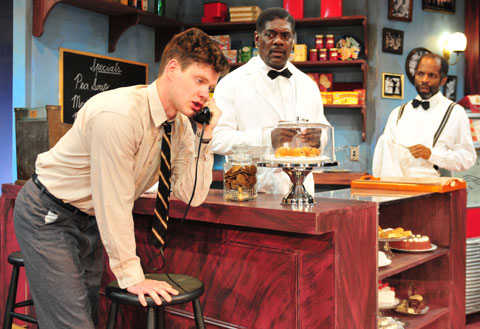
FEARLESS Johnny Lee Davenport stars in a production of the Gloucester Stage production of Athol Fugard's masterpiece — born during apartheid and still packing a powerful punch. |
I first had the autobiographical Molotov cocktail that is "Master Harold" ... and the boys hurled at me in the early 1980s, when Nelson Mandela was still a prisoner and apartheid was law in South Africa. Those bad old days may be gone but, as a detonative revival by Gloucester Stage Company (through August 12) proves, the play has lost none of its power.
Braiding the political with the deeply personal, Fugard's play (which has been filmed twice) is set in 1950 on a rainy afternoon spent by a 17-year-old white youth in the ebullient company of the two black men who man the Port Elizabeth tea room that is his mother's business. Like most of Fugard's works, "Master Harold" is built on a perhaps too-neat metaphor: an upcoming ballroom competition in which the black men look forward to participating, at least for an evening, in "a world without collisions." What the audience experiences, however, is a very painful collision in which ingrained racism puts a big dent in both a tender relationship and the boy's best interests. The playwright this callow, wounded boy was to become would spend his estimable career endeavoring to raise a flag and repair the damage.
At GSC, in an intimate space nicely decked out in period detail and tired-looking pastry by set designer Jenna McFarland Lord, events unfold in a manner that's both casual and larger than life. Sam and Willie, the "boys" of the title, practice their dance moves between bouts of floor scrubbing and tablecloth folding. Master Harold, or Hally, shows up from school hauling a briefcase full of schoolbooks and a lot of attitude. While Sam lovingly buffs the satchel, Hally somewhat superciliously shares the fruits of his knowledge both historical and mathematical. But as news first threatens and then arrives that Hally's difficult father, a boozer and an amputee, is to be released from the hospital to once again wreak havoc at home, the tone changes. Perhaps inevitably, the intermingled love and shame Hally feels for his weak, crippled dad will twist itself into an unspeakable renunciation of the proud black man who has discreetly served as his surrogate father. In this fine production, it's a nasty if purgative thing to witness.
Under Benny Sato Ambush's delicate if fearless direction, the devolution of the companionable interaction among the three characters is a thing that first bubbles and then explodes, courtesy of an ensemble that's as galvanic as the play. The trio of Johnny Lee Davenport, Anthony Wills Jr., and Peter Mark Kendall not only capture the distinctive, full-throttle personalities of their characters but also fold them into the infectious rhythms of South African speech.
As the playful Willie, Wills exudes spontaneity and boasts an accent that's spot-on. As enthusiastic learner and subtle mentor Sam, a droll Davenport actually manages to have some fun — before the character is pushed beyond endurance — with Sam's alleged subservience. And as the young Fugard stand-in, holding forth in his rumpled prep-school duds and youthful pretension, Brown/Trinity Rep conservatory student Kendall (whose family emigrated from South Africa) is a wrenching mix of ill-worn authority and cowering vulnerability. To hold one's own against the frisky force of nature that is Davenport is no mean feat. And to borrow on the play's ballroom metaphor, Kendall manages it with no left feet.